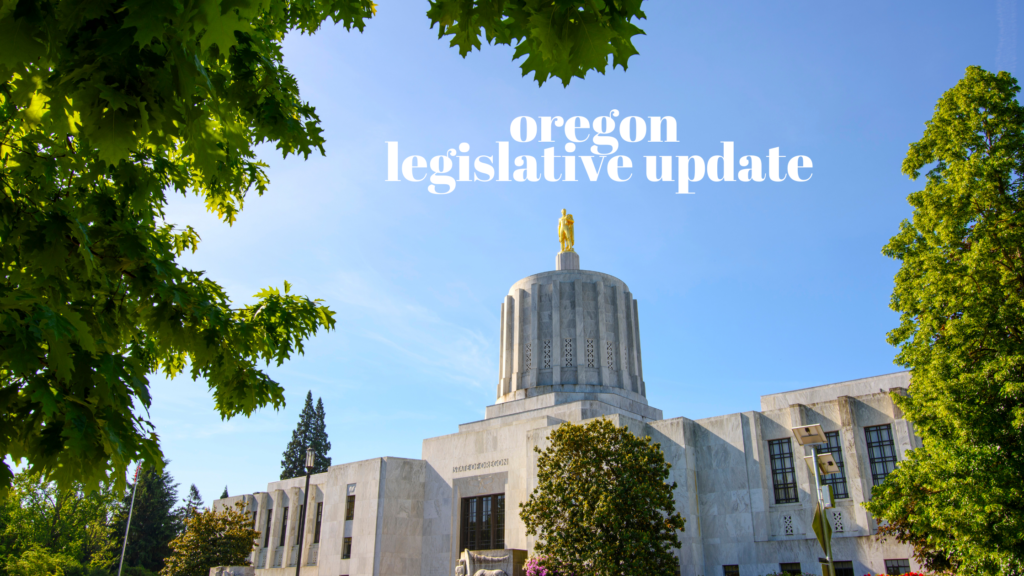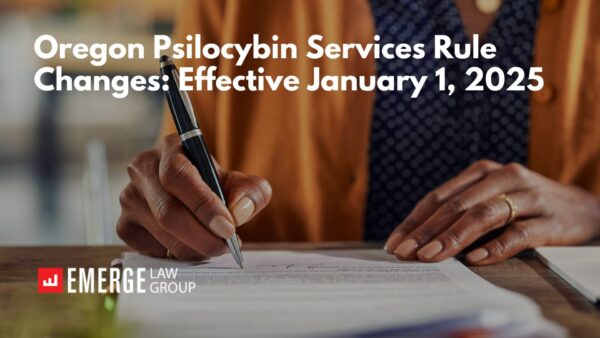The Oregon Legislative Assembly adjourned on Friday, July 7, 2017. As the dust from this session settles, the State of Oregon will begin implementing several substantial changes to its marijuana regulations. SB 1057, SB 56, HB 2198 and SB 1015 are the main bills passed during the legislative session. We will be posting a three-part series this week summarizing the bills.
SB 1057, is the most comprehensive measure the legislature enacted related to cannabis. Among other things, this measure expands the Oregon Liquor Control Commission’s (“OLCC”) authority to regulate parts of the Oregon Medical Marijuana Program (“OMMP”), creates marijuana promotional events, and revamps the existing “bump-up” canopy option for recreational producers who elect to serve medical patients.
Please see a summary of the key provisions below:
Tracking Requirements for OMMP Patients
The new law requires certain OMMP registrants to track the production, transfer, and processing of medical marijuana with OLCC’s existing tracking system. Registered grow sites with more than twelve plants, processing sites, and dispensaries (“Registrants”) must use the tracking system. To cover extra costs incurred by the tracking system, the Oregon Health Authority (“OHA”) will impose an additional fee on Registrants. OHA must deposit the money collected from the fees into the Marijuana Control and Regulation Fund.
Registrants will have the option to choose to remain OHA Registrants subject to tracking or to convert to OLCC (recreational) licensees. Each Registrant must notify OHA whether they are electing to apply for OLCC licensure or remain under the medical system by December 1, 2017. If the Registrant elects to apply for OLCC licensure, they must do so on or before January 1, 2018, or it will not be able to renew its OHA registration.
If the Registrant elects to remain within the medical system, the law requires them to submit to the OLCC tracking system on or before July 1, 2018. Failure to comply with the tracking requirements by this deadline will bar OHA registration renewal.
Immature Plant Limits
SB 1057 provides that medical cardholders and designated primary caregivers may jointly possess up to twelve immature plants and up to six mature plants at a residence. The law also allows for two immature plants for every one mature plant allowed at a designated marijuana grow site. If a designated medical grow site is located within the city limits of an area zoned for residential use, the law allows growing up to twelve mature plants and twenty-four immature plants. However, HB 2198, currently awaiting the Governor’s signature alters these limits.
*Note: Under subsequently passed SB 56, if a designated medical grower submitted an OLCC producer application on or before June 24, 2017, they will not be subjected to the immature plant limits established under SB 1057.
Exclusively Medical Licenses
In response to indications that potential changes in federal marijuana policy are less likely to affect medical marijuana programs, SB 1057 allows the OLCC to designate licensees as “exclusively medical licensees.” Licensees may register with the OLCC as exclusively medical licensees if certain conditions are met, such as attesting to transfer products only between other licensees with “medical purpose” registrations.
Bump-Up Canopies
This provision modifies the OLCC’s current bump-up canopy program (which allows OLCC-licensed producers to enter into agreements with patients to provide them medical marijuana from separately designated medical canopy space). Under the new provision, OLCC-licensed marijuana producers may apply to designate up to an additional 10 percent of the total size of their medical and recreational canopy square footage to produce marijuana for medical patients. Marijuana producers who elect this option must provide seventy-five percent of the marijuana produced from the additional canopy space to OHA-registered patients for free. Also, the OLCC will no longer require patient/producer agreements. As an incentive to add medical canopy, the OLCC will allow producers to sell the remaining twenty-five percent to other licensees. As the recreational system continues to attract medical growers, this option is designed to ensure that medical patients continue to receive medication free of charge.
Marijuana Promotional Events
Under certain conditions, SB 1057 allows OLCC licensees to exhibit marijuana items at trade shows (such as the Oregon State Fair and similar events). Although live immature plants were already displayed at the 2016 Oregon State Fair, this provision allows participating licensees to exhibit all types of marijuana items.
The OLCC has already adopted a temporary rule implementing this provision. The rule, effective until at least December 27, 2017, dictates the specific conditions under which organizers may conduct these events. These conditions include the following:
- The designation of an “event organizer,” who is responsible for ensuring that all licensee participants adhere to OLCC’s rules and restrictions regarding the event.
- Promotional event applications must be submitted by event organizers in writing at least twenty-eight days before the event date.
- All the marijuana items transported and displayed must be tracked in OLCC’s cannabis tracking system (“CTS”) and immediately returned to the licensed premises following the event.
- Each marijuana item is required to have the item’s associated Universal Identification (“UID”) tag affixed to the item or its package.
- Participants and organizers must prevent minors from accessing the marijuana items during these events.
- Events may not be held at a licensed premises or in a city/county that has prohibited recreational marijuana businesses.
*Note: Industrial hemp products may not be displayed at these events.
Increased Authority for OLCC Regulatory Specialists
In addition to OLCC personnel’s existing right to conduct inspections and investigations, the law grants OLCC regulatory specialists additional powers to make seizures and aid in the criminal prosecution of licensees. This broader authority is intended to prevent marijuana diversion into the black market. The OLCC may also proceed with investigations or disciplinary actions against licensees regardless of whether their licenses have lapsed, been revoked, or suspended. Applicants who withdraw their application or renewals may also be subjected to these disciplinary actions.
There are limitations to OLCC’s authority, however. OLCC may not inspect/investigate medical cardholders, primary caregivers, or the residences and locations where cardholders and their caregivers produce marijuana. The law prohibits OLCC regulatory specialists from acting in the capacity of a federal official, carrying a gun, and from conducting inspections of unlicensed primary residences. These provisions bring the state regulatory program further in line with the Cole Memo’s federal enforcement priorities.
Financial Disclosure
OLCC may now require persons with a “financial interest” in a licensed recreational marijuana business to submit sworn statements to the OLCC that show the person’s name and address, as well as the nature and extent of their financial interest. OLCC has already released application forms that require persons with a financial interest to disclose their home addresses. We previously discussed the nuances of this requirement and how it affects applicants and licensees in our April 4, 2017 blog post found here.
Labeling Duties Transferred to OLCC
On January 1, 2018, OLCC will assume responsibility for adopting and enforcing labeling requirements formerly under OHA’s purview. Until OLCC creates new rules, the labeling and packaging requirements remain as is under OAR 845-025-7000 to 845-025-7060 and OAR 333-007-0010 to 333-007-0100.
OHA Database
SB 1057 requires OHA to establish, maintain, and operate an electronic database for storing certain patient and marijuana grow site registry information to increase efficiency between agencies responsible for administering the OMMP. While OLCC and the Department of Revenue will be allowed to access the database, the stored information is confidential and may not be publicly disclosed. The law does not require OHA to store information related to patients’ debilitating conditions. Patients’ and Registrants’ contact information will also be confidential unless the information is related to a designated grow site’s location.
We are carefully monitoring developments as the OLCC implements these changes. In the meantime, remember to always stay tuned to our Facebook and blog updates!





